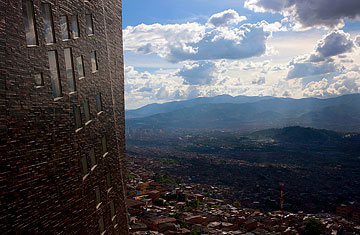
Colombian renaissance A new, ultramodern library in the low-income area of Santo Domingo overlooks Medellín
(2 of 3)
At the Cartagena summit, Santos tells TIME, he's poised to reiterate the bold call he made late last year to take a hard look at the world's largely failed drug-war strategy — and to start a discussion on legalizing or decriminalizing drugs as a way to sap the titanic finances of cartels (which still afflict Colombia, the No. 2 cocaine producer, behind Peru). "I want the world to discuss if we are doing the correct thing or if there are possible alternatives that are less costly" in terms of lives and interdiction resources, he says. And Santos, like most Latin American leaders, feels the U.S. — which rejects legalization even though Obama says it's a "legitimate topic" — is obliged to join that conversation, given its voracious drug consumption.
Santos also intends to talk about another inter-American elephant in the room: Cuba. The communist island was barred from the five previous Summits of the Americas, and Santos, in a bow to the U.S., did not invite President Raúl Castro to this one. But last month he visited Castro in Havana and pledged to find ways at Cartagena to include Cuba in the next summit. It illustrated Colombia's rapprochement with the Latin American left, especially the anti-U.S. Chávez. But it also reflects Santos' desire to make Colombia the elusive "bridge" between the U.S. and the world across the Caribbean at a time when the former's influence in the latter has never been lower — and when that of China (now Colombia's No. 2 trading partner after the U.S.) is mushrooming.
Washington conservatives, in fact, find Santos' shift away from Uribe's reliably pro-U.S. and anti-Chávez stances unsettling — as does Uribe, who has become one of Santos' most vocal critics. But Santos insists that he and Obama share "a good chemistry." (They even had a friendly bet on whether Santos' U.S. alma mater, the University of Kansas, would make it to the Final Four of last month's national basketball tourney. It did.) Obama's senior Latin America adviser, Dan Restrepo, tells TIME, "We welcome President Santos' approach and Colombia's emergence as an increasingly capable partner ... in the region and on the global stage." As for the growing sense of alienation between America and Latin America, Santos says simply, "The more they look south again, the more we'll look north again."
As the gateway to South America and the continent's only country with port access to both the Atlantic and Pacific oceans, Colombia seemed a logical hemispheric bridge from the moment it became Latin America's first democracy in 1819. But it served instead as a showcase of the region's dysfunction. Chronic Liberal-vs.-Conservative fighting morphed into the current conflict — which in the 1990s, with the FARC dominating much of southern Colombia, threatened national partition. Meanwhile, drug lords like Medellín cartel boss Pablo Escobar (killed in 1993) terrorized cities and assassinated politicos. "At that point," says Shifter, "the country itself was on the line."
In 1999, Bogotá invited an alarmed U.S. to step in with Plan Colombia, a $5 billion aid project to strengthen Colombia's feeble military. Santos acknowledges it as "probably the most successful bipartisan foreign policy initiative in the recent history of the U.S." But a game changer was the 2002 election of Uribe, the prickly, hard-nosed former governor of the northern Antioquia department whose rancher father had been killed by the FARC. Uribe dealt the guerrillas one body blow after another, especially after handing the defense post to Santos — who, "modesty aside," calls himself "the most successful Defense Minister this country has had in its last 50 years." He upgraded intelligence and ordered strikes that either killed or captured just about every top FARC commander — and in 2008 tricked the rebels into freeing 15 high-profile hostages, including three U.S. defense contractors and former Colombian presidential candidate Ingrid Betancourt.
Resisting Reforms
With Uribe limited to two terms, his obvious successor was Santos, who won the 2010 election in a landslide. He was, it seems, born to Casa de Nariño. A scion of one of Colombia's most prominent clans — his great-uncle was President from 1938 to '42 and his family owned the country's top newspaper, El Tiempo, until 2007 — Santos groomed himself from an early age for statesmanship. (Literally: friends say as a younger man, he shaved his beard upon realizing that few world leaders wore them anymore.) As a student at the London School of Economics, he was a voracious reader of political biographies like Winston Churchill's.
But because Santos' successes were so tied to Uribe's presidency, there was a mistaken impression inside and outside Colombia that he was as conservative as his old boss. Santos insists he was always a moderate; in 1999 he'd written a book with the help of then British Prime Minister Tony Blair titled The Third Way. Much of Santos' presidency is bent on showing the Latin American right that it can reconcile capitalism and socialism to the same fruitful effect that Lula and much of the Latin left have done. "This," Santos tells TIME, "is the best approach for Latin America," where "third way" countries like Brazil and Chile are escaping third-world status.
